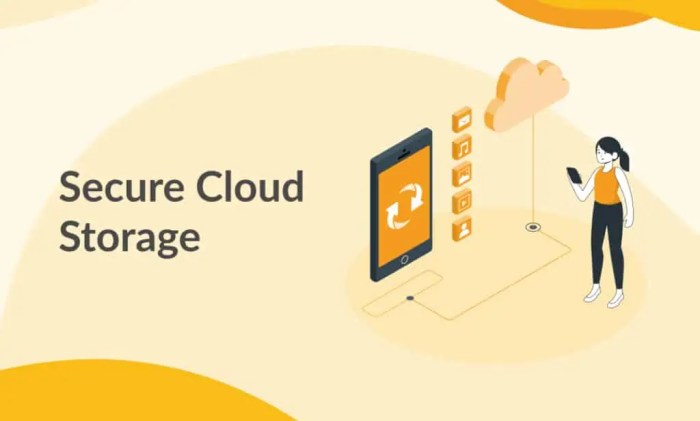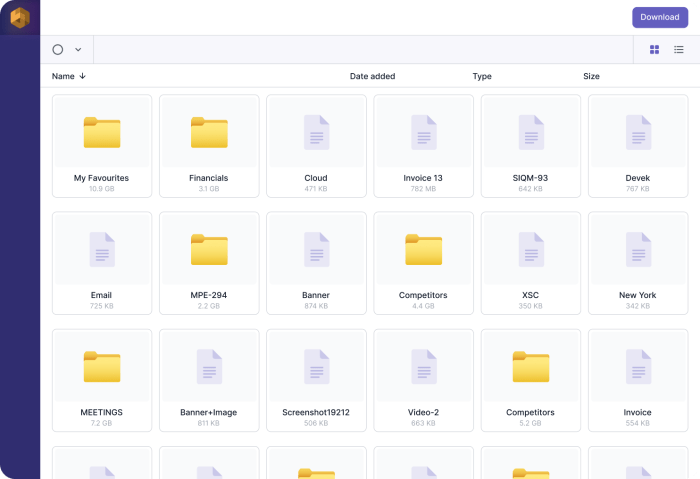Secure cloud storage software for backing up important files – In today’s digital world, data is king. We store our lives – photos, videos, documents, financial records – in digital formats. Losing this data due to hardware failure, theft, or malicious attacks can be devastating. This is why secure cloud storage has become increasingly crucial for individuals and businesses alike. This comprehensive guide will explore the landscape of secure cloud storage software, helping you choose the best solution for backing up your important files.
Understanding the Importance of Secure Cloud Backup
Traditional backup methods, like external hard drives, offer limited protection. They are susceptible to physical damage, theft, and even complete loss in case of a house fire or natural disaster. Cloud storage, on the other hand, provides several key advantages:
Key Benefits of Cloud Backup:
- Accessibility: Access your files from anywhere with an internet connection.
- Redundancy and Disaster Recovery: Data is replicated across multiple servers, ensuring high availability and resilience against data loss.
- Scalability: Easily increase or decrease storage capacity as your needs change.
- Cost-Effectiveness: Often more affordable than maintaining your own on-site backup infrastructure.
- Versioning and File History: Many services offer versioning, allowing you to revert to previous versions of your files.
Choosing the Right Secure Cloud Storage Software: Key Features to Consider
Selecting the appropriate cloud storage solution requires careful consideration of several factors. Don’t just focus on price; prioritize security and features relevant to your needs.
Essential Features:
- Encryption: Look for services that offer both in-transit (data encrypted while traveling between your device and the cloud) and at-rest (data encrypted while stored on the server) encryption. End-to-end encryption, where only you hold the encryption keys, offers the highest level of security. Consider services supporting AES-256 encryption as a minimum standard.
- Two-Factor Authentication (2FA): This adds an extra layer of security, requiring a second form of verification (like a code from your phone) in addition to your password.
- Access Controls and Permissions: Ability to control who can access your files and set granular permissions.
- Data Location and Compliance: Consider where your data is stored and whether it complies with relevant regulations (e.g., GDPR, HIPAA).
- Versioning and Revision History: The ability to recover previous versions of your files is invaluable in case of accidental deletion or corruption.
- Automatic Backups and Scheduling: Automated backups ensure regular data protection without manual intervention. Schedule backups based on your needs (hourly, daily, weekly).
- Bandwidth Management: For large backups, consider services with robust bandwidth management capabilities to avoid impacting your internet speed.
- Customer Support: Reliable customer support is essential in case you encounter any issues.
- Integration with Other Services: Check for compatibility with your operating system, other applications, and existing workflows.
Top Secure Cloud Storage Providers
Several reputable providers offer secure cloud storage solutions. This is not an exhaustive list, and the best choice will depend on your specific needs and budget.
Examples of Secure Cloud Storage Providers:, Secure cloud storage software for backing up important files
- Backblaze: Known for its affordable pricing and unlimited storage for computer backups.
- IDrive: Offers robust security features, including end-to-end encryption and 2FA.
- SpiderOak.com: A privacy-focused provider emphasizing end-to-end encryption and zero-knowledge architecture.
- Sync.com: Another strong contender in the secure cloud storage space with a focus on privacy and security.
- Tresorit: A business-oriented solution with advanced security features and strong encryption.
- Dropbox (with additional security measures): While not solely focused on security, Dropbox offers robust features when paired with additional security measures like 2FA and strong passwords.
- Google Drive (with additional security measures): Similar to Dropbox, Google Drive benefits from additional security layers for enhanced protection.
- Microsoft OneDrive (with additional security measures): Microsoft’s cloud storage solution also requires additional security measures to maximize its security capabilities.
Security Best Practices for Cloud Storage
Even with the most secure cloud storage provider, it’s crucial to follow best practices to maximize your data protection.
Security Best Practices:
- Strong Passwords: Use unique, complex passwords for all your accounts. Consider using a password manager.
- Enable Two-Factor Authentication (2FA): This is essential for preventing unauthorized access even if your password is compromised.
- Regular Software Updates: Keep your operating system, applications, and the cloud storage software updated to patch security vulnerabilities.
- Regular Backups: Establish a consistent backup schedule to ensure your data is regularly protected.
- Monitor Your Accounts: Regularly check your cloud storage account for any unusual activity.
- Understand the Provider’s Security Policies: Review the provider’s security policies and practices to ensure they align with your requirements.
- Data Encryption: Utilize encryption features provided by your cloud storage provider to protect your data both in transit and at rest.
Frequently Asked Questions (FAQ)
- Q: Is cloud storage safe? A: Cloud storage can be very safe if you choose a reputable provider and follow best security practices. Look for providers with strong encryption, 2FA, and transparent security policies.
- Q: What is end-to-end encryption? A: End-to-end encryption means only you have the keys to decrypt your data. Even the cloud provider cannot access your files.
- Q: How much does cloud storage cost? A: Prices vary widely depending on the provider, storage capacity, and features. Some providers offer free plans with limited storage, while others offer tiered pricing based on your needs.
- Q: What happens if my cloud storage provider goes bankrupt? A: Reputable providers have robust disaster recovery plans. However, it’s wise to choose a provider with a strong track record and to regularly download critical files as an extra precaution.
- Q: Can I access my files offline? A: Most cloud storage services allow you to sync files to your local device, providing offline access. However, this requires sufficient local storage space.
- Q: How do I choose the right cloud storage provider for my business? A: Consider your business’s specific needs, including compliance requirements, data security needs, and scalability. Many providers offer business-specific plans with enhanced features and support.
References: Secure Cloud Storage Software For Backing Up Important Files
Call to Action
Protecting your valuable data is paramount. Don’t wait until it’s too late. Start exploring secure cloud storage options today and safeguard your digital assets. Choose a provider that aligns with your security needs and budget, implement robust security practices, and enjoy the peace of mind that comes with knowing your data is safe and accessible.
Key Questions Answered
What are the common security risks associated with cloud storage?
Common risks include data breaches due to vulnerabilities in the provider’s systems, unauthorized access through weak passwords or compromised accounts, and potential loss of data due to provider outages or failures.
How do I choose the right cloud storage provider for my needs?

Source: folderit.com
Consider factors like storage capacity, pricing, security features (encryption, two-factor authentication), ease of use, and customer support when selecting a provider. Read reviews and compare offerings before making a decision.
What happens if my cloud storage provider goes out of business?
Reputable providers usually have data migration plans in place. However, it’s advisable to regularly download copies of your most critical data as an extra precaution.

Source: beeble.com
Is my data truly secure in the cloud?
The security of your data depends heavily on the provider’s security measures and your own practices (strong passwords, two-factor authentication). Choose providers with robust security protocols and follow best practices for data protection.
